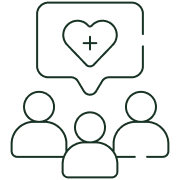Individual work
Individual session is a way in which we have complete freedom to explore personal stories and painful situations from the past that limit us today. The pace of the work is dictated by the client’s process, and the client chooses the topic they want to look into and the depth they want to let themselves go into.
The process is not easy, nor is it quick. It can be frustrating, painful, and it can feel like we are going in circles. But we can grow from it in a way we never have before, and allow new parts of us to come to life. We learn new skills, and that takes time – just as it took us time to learn to read and write. It also brings the healthiest part of us into the process. Something that can provide healing to old hurts in a way that was previously inaccessible. I welcome that part of each client that wants better for themselves, that wants a sense of peace and resolution. It is brave to embark on this path, and I am here to support you in looking at all the parts that are entangled with trauma, emotional hurts, bad self-images and feelings that are difficult to accept.
My education is in body psychotherapy, which means that in our work we occasionally use movement through space and physical touch as tools. Also, that we pay attention to breathing and physical sensations, such as “lump in the throat” or “I breathe easier and calmer”.
However, I believe that the most important thing is the relationship that we create together, and that we create a safe atmosphere, in which we can unravel old and difficult feelings. And at the same time find compassion for ourselves and allow it to become our strength, and that this time we can accept old pain in a different way.
RULES
Appointments are arranged in advance, and it is recommended to arrange several appointments in advance in order to ensure enough for the chosen rhythm.
The client can cancel the appointment free of charge up to 24 hours before the agreed appointment, without explanation, and the counsellor too, with a possible agreement on a new appointment.
If the client cancels the appointment within 24 hours of the appointment, the appointment is paid as if it had been held. If the counsellor cancels the appointment within 24 hours of the appointment, the next appointment is free of charge.
The appointment lasts 60 minutes and starts at the agreed time, so there is no “being late” – but there is less time left for therapy.
When working in person, we respect all the rules of the space in which the therapies take place, and most often they relate to talking loudly in the hallway before entering our own room. When working online, the most important thing is that you have your own privacy and that no one disturbs you.
Also, a good internet connection is crucial for the ability to communicate. It is recommended to connect a few minutes early to establish a connection and eliminate potential technical difficulties. Also, to focus on working together and shift attention to yourself and to “inside”.




